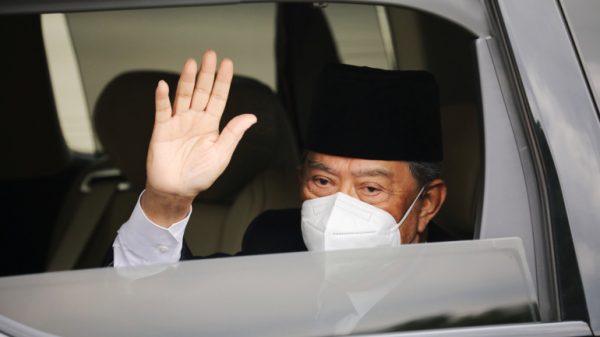Malaysia PM quits after just 17 months in office

- Update Time : Monday, August 16, 2021
- 111 Time View

Malaysia’s prime minister and his government resigned Monday after just 17 months in office, throwing the country into fresh political turmoil as it battles a serious coronavirus outbreak.
Muhyiddin Yassin’s tumultuous period in office came to an end after allies withdrew support and a last-ditch bid to cling to power failed, and he becomes the shortest serving premier in Malaysian history.
After a final cabinet meeting, the 74-year-old headed to the national palace to submit his resignation to the king.
Science Minister Khairy Jamaluddin confirmed on Instagram that the entire cabinet had quit.
“Thank you for the opportunity to, once again, serve the nation,” he wrote.
Mohamad Redzuan Yusof, a minister in the prime minister’s office, confirmed to AFP that Muhyiddin had tendered his resignation, and it had been accepted.
Muhyiddin was reportedly set to address the nation later Monday.
There is no clear successor to Muhyiddin but an election looks unlikely as the country faces its worst Covid-19 wave yet and an economic downturn.
Rather, a period of political horse-trading is expected before a new coalition emerges that can command a majority in parliament.
“His replacement is anybody’s guess,” said Oh Ei Sun, an analyst at the Singapore Institute of International Affairs.
Malaysia’s constitutional monarch formally appoints the premier, and it will be up to him to assess who has sufficient backing from MPs.
Muhyiddin came to power in March last year without an election at the head of a scandal-plagued coalition following the collapse of a two-year-old, reformist government led by nonagenarian political heavyweight Mahathir Mohamad.
But his government faced turmoil from day one — his majority in parliament was in doubt, its legitimacy was constantly questioned, and he faced a constant challenge from opposition chief Anwar Ibrahim.
– Criticism over virus response –
The demise of his government extends a period of political drama for the multi-ethnic nation of 32 million.
After independence from Britain in 1957, Malaysia was ruled for over six decades by a coalition dominated by the country’s ethnic Malay Muslim majority.
But corruption scandals, unpopular race-based policies and increasingly authoritarian rule prompted weary voters to boot the coalition and its leader Najib Razak out of power at 2018 polls.
The victory of Mahathir’s opposition alliance fuelled hopes for a new era, but it collapsed amid bitter infighting.
Muhyiddin, who had been a member of Mahathir’s government but ended up plotting its downfall, hammered together a ramshackle coalition.
As well as questions over its legitimacy, it faced mounting criticism over its failure to keep the virus outbreak under control — officials have now reported over 1.1 million cases and 12,000 deaths.
In January, Muhyiddin persuaded the king to declare Malaysia’s first nationwide state of emergency for over half a century, ostensibly to fight the pandemic.
But parliament was also suspended for months, leading to criticism that Muhyiddin was using the crisis to avoid a no-confidence vote.
Muhyiddin’s position finally became untenable after a group of once allied MPs withdrew support, depriving him of a parliamentary majority, and the king, Sultan Abdullah Sultan Ahmad Shah, turned against him.
He made his last bid to stay in power on Friday, appealing to opposition MPs to back him in a no-confidence vote — but his offer was rejected.















